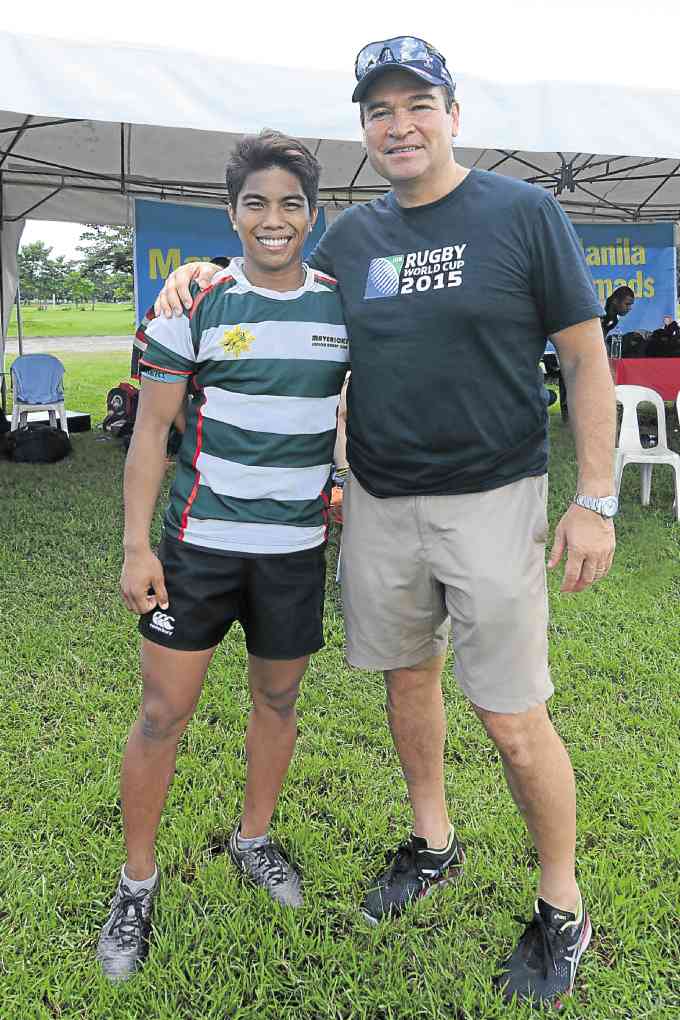Hooked on Rugby

Lito Ramirez races for a try for his CBRE rugby team and then obliges a photographer friend after the game. Inset, Ramirez with PRFU’s Rick Santos
There’s no need to ask Lito Ramirez if he finds playing rugby too rough. After all the hard tackling and forceful pushing, he just rises up and dusts off.
At 22, Ramirez knows what rough really means.
“If not for rugby, I would still be wandering in the streets,” Ramirez says in Filipino. “Probably I’m doing drugs, doing bad things. I’m really thankful that I ended up in a foundation, learned rugby and developed my skills.”
Ramirez—the first homegrown player to make it to the Philippine men’s Rugby Sevens team—doesn’t mind sharing his past. And there’s already a familiar refrain in his storytelling: If it wasn’t for the sports of rugby, he’d probably be sniffing rugby, a cheap, industrial glue that some street kids get hooked on to alleviate hunger.
It’s a pun that Ramirez likes to dish out because it’s true. And Rick M. Santos, president of the Philippine Rugby Football Union (PRFU), thinks it’s Ramirez’s story, and how he triumphantly tells it—not a pity-party as some would probably do—that had many rugby hopefuls drawn to their budding star.
“Lito’s positive demeanor makes him very likeable off the field,” says Santos. “He is popular among kids aspiring to become rugby players. They look up to him as a role model and living proof that people of all shapes and sizes can play rugby. No matter what your background is, what is important are your skills and determination to be successful in the sport.”
Ramirez guesses he was just seven years old when his parents abandoned him and his older brother Jay in the streets of Quezon City. They begged, trawled through garbage, and snatched wallets and valuables to survive.
He looked doomed to a life of a thug. Although several shelters for children tried to care for him—where the surname Ramirez was appended to his legal name, after the person who first found him—he ended up back in the streets.
At 11, Ramirez got taken in by Tuloy sa Don Bosco Street Children Village in Muntinlupa City. And it’s there where sports saved his life.
Out of all the activities offered to the children in Tuloy, it’s rugby that got Ramirez hooked. “I was curious how it was played,” he says. “It was unique. I haven’t seen anything like it.”
Usually, burly players dominate rugby. Ramirez was slight, but quick—all developed from running away from the police, as some would tease him. “I can run fast, that was my advantage,” he says. “And I started to enjoy the sport.”
For the past several years, foreign players with Filipino roots make up the national rugby team known as the Volcanoes. It’s still a growing sport in the country with a similarly developing grassroots program. Ramirez was among those spotted and invited to be part of the program. “They said I had potential,” he recalls.
He started with touch rugby, trained with the national development team, got selected to play for the national under-16 and under-18 squads, and later, invited to practice with the Volcanoes.
“I had to adjust,” Ramirez recounts. “It was a big adjustment with the national team because they’re foreigners. Just the language, I had a hard time. I couldn’t understand some of the set plays. And it was hard because they were big and fast.”
By late 2015, through sheer patience and hard work, the 5-foot-5 dynamo got tapped to play as winger and fullback for the Volcanoes, becoming the first national player to come out of the grassroots development program.
“I was proud of myself,” says Ramirez, who has bulked up a bit, even though speed remains his best asset. “I just wanted to play. I never expected to be part of the national team.”
Although he’s now the poster boy of local rugby, Ramirez has more to show.
“With his speed and agility, Lito has a lot of potential to play for the national men’s 15s team after having already competed in international Sevens rugby,” says Santos. “He complements his natural talent with a positive mindset and is not one to let bigger players scare him off.”
“I’ve seen him grow as a player, and I admire his full commitment to training and continuous learning and improvement,” adds Santos. “He has worked extremely hard to reach this level, but he also keeps both feet on the ground despite his accomplishments.”
The inspiring story of the lone homegrown Volcano has even reached media outlets in Australia and New Zealand, two of the world’s rugby powerhouses, where he was recently featured in online magazines.
While Ramirez doesn’t forget his past, he also wants to be part of Philippine rugby’s future. For the past year, he has also worked as a development officer of PRFU, where he’s assigned to train children from different foundations in Muntinlupa.
“Lito is doing his part to give back to the sport of rugby,” says Santos. “I think Lito is providing these kids a great opportunity toward a better future by imparting valuable lessons that will be useful in school, work and life.”
Says Ramirez: “I just tell the kids that at first, rugby may be hard. But they just have to keep trying. That’s what I did.”














